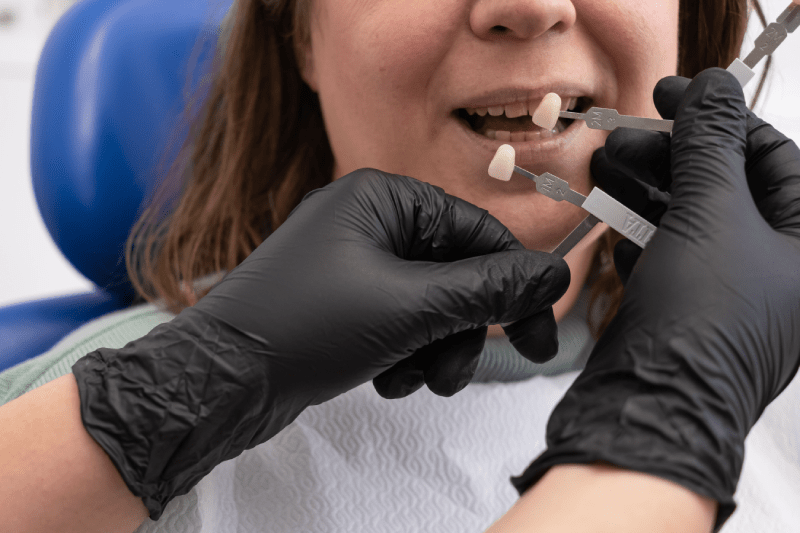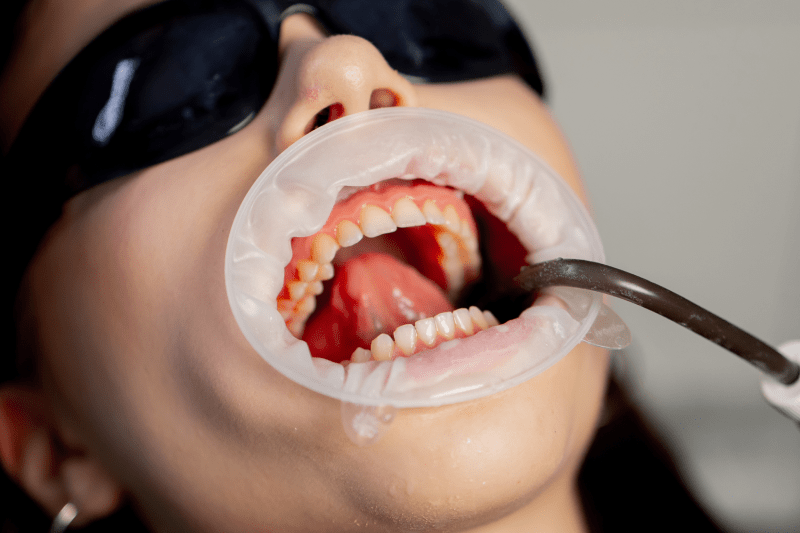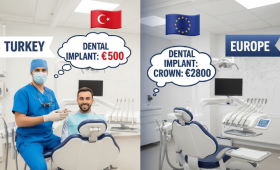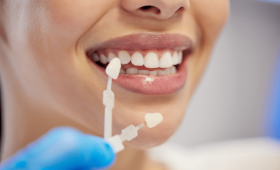What Are Dental Veneers And What Do They Do?
A dental veneer is an extremely thin, custom-made layer of porcelain or composite material that is bonded to the front surface of a tooth. These veneers are used for aesthetic purposes and offer a perfect solution to improve the color, size, shape, and length of teeth. They hide permanent stains on your teeth, close small gaps, and correct minor misalignments.
Veneers are meticulously designed and applied by dentists to achieve a natural tooth appearance. This treatment not only improves the aesthetic appearance but also adds an extra protective layer to your teeth, making them more durable. Overall, veneer treatment is a minimally invasive procedure that allows you to achieve dramatic results in a short amount of time, enhancing both your smile’s beauty and your oral health.
In Which Cases Should Dental Veneers Be Applied?
There are several main reasons for getting dental veneers. The most common is to hide permanent and severe tooth stains that cannot be removed with teeth whitening methods. These stains, caused by smoking, coffee, tea, or certain medications, can be permanently masked with veneers. Dental veneers are also used to close gaps between teeth (diastema), repair minor chips or cracks, and correct irregularly shaped teeth. Making small teeth look larger and more proportionate or restoring worn-down teeth are also common applications of veneer treatment. These aesthetic solutions help patients regain their smile and boost their self-confidence. They are a versatile solution for a range of cosmetic dental issues.
How Long Does The Dental Veneer Application Take?
The dental veneer application is generally completed in two to three appointments. In the first appointment, the dentist checks your oral health, listens to your expectations, and creates a treatment plan. In this appointment, your teeth are prepared for the veneer and impressions are taken.
The preparation of the teeth involves removing a minimal amount of enamel to ensure the veneer sits naturally. In the second appointment, the custom-made veneers from the lab are bonded to your teeth one by one. Depending on the number of veneers and the complexity of the treatment, the entire process can take from a few days to a few weeks. Thanks to modern dental technology, in some cases, this process can be completed in a single day.
Does The Dental Veneer Procedure Hurt?
Pain is generally not felt during the dental veneer procedure because your dentist applies local anesthesia to the area to be worked on. This way, you won’t experience any discomfort during the preparation of your teeth and the placement of the veneers. After the procedure, there may be some mild sensitivity or pain, but this usually subsides on its own within a few days. To minimize the duration and severity of sensitivity, you can use sensitivity-reducing toothpaste recommended by your dentist. If the pain is severe or persists for a long time after the procedure, it may indicate a problem with the fit of the veneers, and you should consult your dentist.
How Durable Are Dental Veneers?
The lifespan of dental veneers depends on the quality of the material used and the patient’s oral hygiene habits. Porcelain veneers can generally last between 10 to 15 years, and in some cases can exceed 20 years. Composite veneers are less durable and may need to be replaced after 5 to 7 years. To extend the life of veneers, it is important to avoid biting on hard foods and for patients with a teeth-grinding habit to use a night guard. Regular dental check-ups are vital for monitoring the condition of the veneers and detecting potential problems early.

What Are The Advantages Of Dental Veneers?
Dental veneers have many significant advantages. First and foremost, they are a minimally invasive treatment method. Since only the front surface of the tooth is covered, the natural structure of the tooth is largely preserved. Veneers provide a very natural and aesthetic appearance because they reflect light just like natural teeth. Porcelain veneers are extremely resistant to staining, which gives them a long-lasting whiteness. Veneers strengthen your teeth without affecting chewing function and correct minor cosmetic imperfections. They are a perfect option for patients who want to achieve impressive results in a short amount of time.
What Are The Disadvantages Of Dental Veneers?
Dental veneers also have some disadvantages. The most significant disadvantage is that the procedure is irreversible. Because a small amount of enamel is removed from the tooth to accommodate the veneers, your teeth cannot return to their original state once the veneers are removed, and you will always need a restoration. Additionally, if the veneers chip or crack, they cannot be repaired and must be completely replaced. This can be both costly and time-consuming. Another disadvantage is that the price of veneers can be high, which can be a significant obstacle for some patients.
What Is The Difference Between Porcelain And Composite Veneers?
Porcelain and composite veneers differ in terms of the material used, durability, aesthetics, and cost. Porcelain veneers are produced in a lab and are stronger and more stain-resistant than composite veneers. Aesthetically, porcelain looks more like a natural tooth and reflects light better. Composite veneers, on the other hand, are applied directly to the tooth by the dentist, are more economical, and can usually be completed in a single visit. However, they are more prone to staining and wear over time. Therefore, those looking for a longer-lasting and more aesthetic result may prefer porcelain veneers, while those looking for a faster and more affordable solution may prefer composite veneers.
How Is The Dental Veneer Application Done?
The dental veneer application usually begins with a detailed planning stage. First, you and your dentist will design your ideal smile together. At this stage, technologies like digital smile design can be used. Then, a very thin layer of enamel is removed from the front surface of your teeth to accommodate the veneers. This process ensures that the veneers sit naturally on your teeth. After your teeth are prepared, impressions are taken and sent to a lab. The lab produces custom-made veneers that fit these impressions. Finally, the veneers are permanently bonded to your teeth with a special adhesive.
How Long Does It Take To Get Dental Veneers?
Dental veneer treatment typically requires two or three appointments. In the first appointment, your teeth are prepared and impressions are taken. This appointment can take about 1-2 hours. In the second appointment, the fit of the veneers from the lab is checked and the final bonding is done. This process can also take about 1-2 hours. The waiting period between appointments varies depending on the lab’s work speed and the number of veneers. In Turkey, most clinics can complete this process within a few days, which is a great convenience for patients traveling for treatment.
What Should Be Considered After Getting Dental Veneers?
Aftercare for dental veneers is very important to extend their lifespan. Maintaining your oral hygiene, regularly brushing your teeth, and using dental floss are the most important steps. Avoiding hard and sticky foods reduces the risk of veneers chipping or cracking. Using fluoride toothpaste recommended by your dentist and avoiding extremely hot and cold beverages also helps reduce sensitivity. Finally, visiting your dentist for a check-up every six months is vital for monitoring the condition of the veneers and ensuring their longevity.
Do Dental Veneers Prevent Tooth Decay?
No, dental veneers do not prevent tooth decay. Veneers cover the front surface of the tooth, but the back and side surfaces remain vulnerable to decay. Plaque and bacteria that accumulate at the edges and under the veneer can cause decay in the underlying tooth tissue. Therefore, it is necessary to pay even more attention to oral hygiene after veneer treatment. Regular brushing, flossing, and periodic check-ups are critical to protecting the health of the tooth under the veneer.
Is Everyone A Suitable Candidate For Dental Veneers?
Whether you are a suitable candidate for dental veneers is determined by a detailed examination by your dentist. In general, you must have good overall and oral health. If you have problems such as gum disease, severe tooth decay, or teeth grinding, these conditions must be treated first. Additionally, it is important that your tooth structure is strong enough to support the veneer. If you have any doubts about your oral and dental health, you can consult with a dentist to make the most informed decision.
What Factors Affect The Cost of Dental Veneers?
The cost of dental veneers varies depending on the type of material used, the number of veneers, the location of the dental clinic, and the dentist’s experience. Porcelain veneers are generally more expensive than composite veneers. Additional costs may also include things like X-rays and teeth cleaning. Cure Holiday offers a transparent pricing policy, sharing all cost items with you before the treatment to prevent any surprise costs.
What Is The Difference Between A Dental Veneer And A Crown?
A dental veneer and a dental crown are two different dental restorations used for different purposes. A veneer is a thin layer that covers only the front surface of the tooth and is generally used for cosmetic purposes. A crown, on the other hand, is like a “cap” that covers the entire tooth and is used to protect a tooth that is damaged, fractured, or weakened. A crown restores both the aesthetics and the function of the tooth. Your dentist will decide which restoration is more suitable for you based on the condition of your tooth.
How Is A Hollywood Smile Achieved With Dental Veneers?
A Hollywood smile is a type of aesthetic and white smile that is achieved with dental veneers. This smile is characterized by perfectly aligned teeth, ideal size and shape, and a flawless whiteness. To achieve this look, veneers are typically applied to the front 8-10 teeth on the upper and lower jaw. Your dentist uses digital smile design technology to create the most suitable smile for your facial features and lip line. The result is a natural-looking yet perfectly aesthetic, bright, and symmetrical smile.
Do Dental Veneers Cause Bad Breath?
Properly made and well-cared-for dental veneers do not cause bad breath. However, if food debris and bacteria accumulate at the edges or underneath the veneers, this can lead to bad breath. Therefore, a regular and effective oral hygiene routine is very important. Cleaning under and around the veneer with special dental floss or interdental brushes prevents problems like bad breath and gum inflammation. Regular check-ups are also important to check the fit of the veneers.
Is The Dental Veneer Procedure Reversible?
No, the dental veneer procedure is an irreversible process. A very thin layer of enamel is removed from the teeth to ensure that the veneers fit perfectly and provide a natural appearance. Since this enamel layer does not regenerate, your teeth cannot return to their original state once the veneers are removed. Therefore, it is important to be aware of this and know that it is a permanent solution when you decide to get veneers.
Do Dental Veneers Stain?
Porcelain veneers are extremely resistant to staining. They are more durable than natural teeth against stains caused by colored beverages and foods like coffee, tea, and red wine. This allows them to maintain their initial brightness for many years. However, composite veneers have a more porous structure than porcelain and are more prone to staining over time. Therefore, more frequent polishing or replacement may be necessary to maintain a bright appearance with composite veneers.
Is There an Age Limit for Dental Veneers?
Yes, there is an age limit for dental veneers. It is generally a suitable treatment for individuals whose jaw and tooth development is completely finished. Therefore, dentists usually recommend that veneers be done on individuals who are 18 years of age or older. Veneers placed at a younger age can lead to incompatibilities and problems as the teeth and jaw continue to develop. For aesthetic problems in individuals younger than this age, reversible methods such as orthodontic treatment are often preferred.

What Materials Are Used For Dental Veneer Treatment?
The most commonly used materials for dental veneer treatment are porcelain and composite. Porcelain veneers offer a superior option in terms of aesthetics, durability, and resistance to staining. High-quality porcelain types like E-max and zirconia provide a perfect match with natural teeth. Composite veneers, on the other hand, offer a more economical and faster solution, but they may fall short of porcelain in terms of durability and aesthetics. Your dentist will help you choose the most suitable material for your expectations and budget.
How Are Dental Veneers Applied?
The application of dental veneers takes place in two main appointments. In the first appointment, the dentist prepares your teeth. This involves abrading a very small part of your tooth enamel to ensure the veneers have a natural appearance. Then, impressions of your teeth are taken and sent to the lab, where your veneers are custom-made. In the second appointment, your dentist bonds the permanent veneers to your teeth one by one and performs final checks. The application process is painless because it is done under local anesthesia.
What Is The Relationship Between Dental Veneers And Smile Design?
Dental veneers are one of the most fundamental elements of smile design. Smile design is a process that aims to create the most ideal smile aesthetically, according to a person’s facial features, lip line, skin tone, and personal expectations. In this process, dental veneers perfect the color, size, shape, and alignment of the teeth, allowing you to achieve the smile of your dreams. Digital smile design (DSD) technology makes it easier for you to make a decision by showing you what your new smile will look like before the treatment begins.
Does Teeth Grinding Damage Veneers?
Yes, the habit of teeth grinding (bruxism) can cause serious damage to dental veneers. The excessive force applied during teeth grinding can cause the veneers to chip, crack, or become dislodged. If you have a teeth grinding habit, your dentist will create a plan to manage this condition before the veneer treatment. The use of a night guard is an effective solution to protect the veneers and minimize the damage from bruxism.
Is It Normal To Have Tooth Sensitivity After Getting Dental Veneers?
Yes, it is normal to experience some temporary sensitivity in your teeth after getting a dental veneer. This sensitivity is caused by the removal of a portion of the enamel during the preparation of the teeth and usually subsides on its own within a few days. You can make this process more comfortable by using toothpaste for sensitive teeth recommended by your dentist or by taking a painkiller. If the sensitivity persists for a long time or becomes severe, it is important to consult your dentist.
What Are The Advantages of Getting Dental Veneers in Turkey?
Turkey is a popular worldwide destination for dental veneer treatment. The most significant advantage is that the cost is much more affordable compared to Western countries. This economic advantage is provided without compromising on quality. Clinics in Turkey use the latest technology and dentists are extremely experienced. Additionally, the opportunity to combine your treatment with a vacation is also a big advantage. Health tourism agencies like Cure Holiday organize this process from start to finish, offering you a comfortable and safe experience.
How Many Teeth Do I Need For Dental Veneers?
There is no minimum number of teeth required for dental veneer treatment. You can even get just a single veneer if you only want to change the color, shape, or size of one of your teeth. However, to achieve a more holistic and symmetrical change in your smile, it is generally recommended to get veneers on the front 4 to 10 teeth on the upper and lower jaw. This significantly improves the overall aesthetics of your smile and provides a more natural result.
Which Dentist Should I Choose For Dental Veneer Treatment?
Choosing the right dentist for your dental veneer treatment is vital for the success of the treatment. You should prefer a dentist who is experienced in cosmetic dentistry, has strong references, and can show you their previous work. It is also important that the dentist can communicate openly with you and correctly understand your expectations. Cure Holiday works with expert and reliable dentists in this field, helping you find the most suitable dentist for you.
Can Gaps Between My Teeth Be Closed With Dental Veneers?
Yes, dental veneers are an effective solution to close small to medium-sized gaps between teeth (diastema). Veneers are designed to be slightly wider than natural teeth, aesthetically filling these gaps and providing a more integrated appearance. This method provides faster results and is less invasive compared to orthodontic treatment.
Is Smoking and Alcohol Use a Barrier to Dental Veneers?
Smoking and alcohol use are not a direct barrier to dental veneer treatment, but they can negatively affect the lifespan and aesthetics of the veneers. Smoking can cause the veneers to stain and turn yellow over time. Alcohol can weaken the adhesive of the veneers, increasing the risk of them becoming loose. For the best and longest-lasting results, it is important to quit or minimize smoking and alcohol use before and after the veneer treatment.
How Quickly Are The Results of Dental Veneer Treatment Noticed?
Dental veneer treatment generally provides results that are noticeable very quickly. You will see an immediate change in your smile as soon as the veneers are bonded. The results become evident even from the first session, and the full results are obtained after the veneers are permanently placed in the second session. This rapid and dramatic change is a great source of motivation for patients.
Can Dental Veneers Repair Cracks or Fractures?
Dental veneers are a great option for repairing small cracks and fractures in teeth. The veneer completely covers the front surface of the cracked or fractured tooth, providing both an aesthetic solution and preventing the tooth from being further damaged. This increases the durability of the tooth and provides long-term protection. However, if the fracture is very large or extends to the nerve of the tooth, a more comprehensive treatment such as a crown may be needed.
Is It Normal to Have Sensitivity in My Teeth After Getting Dental Veneers?
Yes, it is normal to feel temporary sensitivity in your teeth after getting dental veneers. This condition is caused by the removal of a part of the enamel during the preparation of the teeth and usually subsides on its own within a few days. You can make this process more comfortable by using toothpaste for sensitive teeth recommended by your dentist.
Do Dental Veneers Change The Shape Of My Teeth?
Yes, dental veneers are specially designed to change the shape and size of your teeth. Your dentist will determine the shape and size that are most compatible with your smile. This way, your very short, worn, or irregularly shaped teeth gain a more aesthetic and symmetrical appearance. This personalized approach allows for a complete transformation of your smile.
Do Dental Veneers Completely Remove The Stains On My Teeth?
Yes, dental veneers are very effective at completely hiding permanent and severe tooth stains. Even in cases where teeth whitening methods are not effective, veneers allow you to have a smile with the whiteness and brightness you desire. Since porcelain veneers are resistant to staining, they can maintain this whiteness for many years.
Is It Possible To Achieve A Natural Look With Dental Veneers?
Yes, it is possible to achieve a very natural look with dental veneers. Modern porcelain materials reflect light just like natural teeth, and your dentist meticulously adjusts the color, size, and shape of the veneers to match your neighboring teeth. This makes it almost impossible to distinguish your veneers from your natural teeth, resulting in an aesthetic and natural smile.

What Stages Are Followed For Dental Veneer Treatment?
Dental veneer treatment generally consists of three main stages. The first stage is the consultation and planning stage with your dentist. The second stage is the preparation of the teeth and taking impressions. In this stage, your teeth are protected with temporary veneers. The third and final stage is the bonding of the permanent veneers to your teeth and the final check-ups. Cure Holiday guides you through each of these stages to ensure a smooth process.
Why Should I Get Dental Veneers With Cure Holiday?
Cure Holiday is one of the most reliable and experienced addresses for dental veneer treatment. It not only achieves aesthetic and successful results but also makes the process a comfortable and stress-free experience for you. Working with the best clinics and expert dentists in Turkey, Cure Holiday creates personalized treatment plans for you and handles all the organization on your behalf. By taking care of all the details like treatment costs, accommodation, and transportation, it leaves you to simply enjoy your new smile.
What Should I Do If I Have More Questions?
If you have more questions about dental veneers or would like a suitable treatment plan to be created for you, do not hesitate to contact Cure Holiday. Our expert team will evaluate your specific situation, answer all your questions, and show you the right path to achieve the smile of your dreams.
What Is The Difference Between A Dental Veneer And A Laminate Veneer?
Although the terms “dental veneer” and “laminate veneer” are often used interchangeably, the term “laminate” refers to the thin, porcelain or composite layer used in dental veneer treatment. So, a laminate is a type of dental veneer. Both terms are generally used to describe this treatment method, which is applied to the front surface of the tooth for aesthetic purposes. The most commonly used types of laminates are porcelain laminate and composite laminate. Both aim to improve the aesthetic appearance but differ in terms of material, durability, and application process.
Is The Maintenance of Dental Veneers Difficult?
The maintenance of dental veneers is the same as the care for your natural teeth. You should brush your teeth at least twice a day, use dental floss, and complete your routine with mouthwash. Since the surface of the veneers is smooth, plaque buildup is less, but the edges and underneath of the veneer must be cleaned carefully. Regular dental check-ups are vital for checking the condition of the veneers and your oral health. By following these simple steps, you can extend the life of your veneers and keep your smile healthy.



